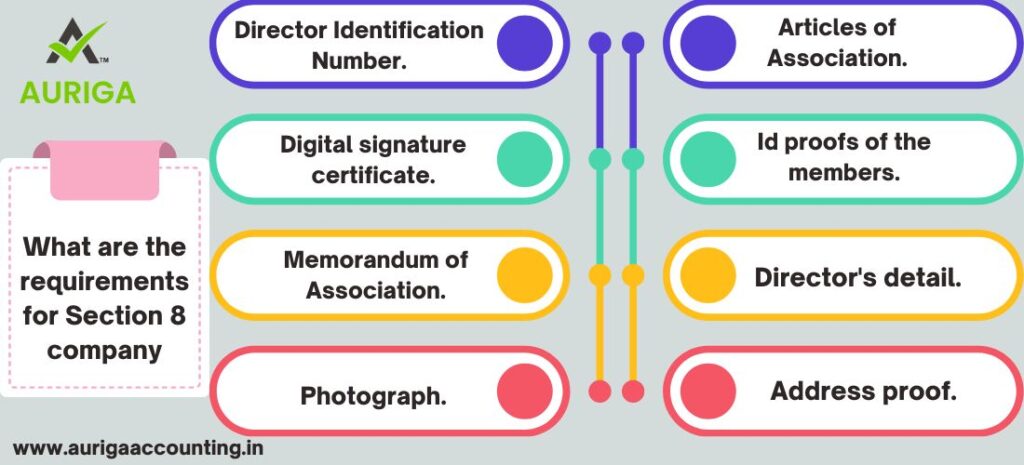
IS THERE A MINIMUM CAPITAL REQUIRED FOR SECTION 8 COMPANY?
Introduction
ToggleYOU NEED TO KNOW MINIMUM CAPITAL REQUIRED FOR SECTION 8 COMPANY?
There is no minimum capital requirement specified for Section 8 Companies, in India under the Companies Act, 2013. The emphasis for Section 8 companies is on promoting charitable activities, social welfare, or other non-profit objectives. Unlike some earlier legal provisions that required companies to have a minimum authorized or paid-up capital, the Companies Act, 2013, eliminated such requirements.
Please note that regulations and laws can be subject to amendments, and it’s recommended to check the latest provisions or consult legal professionals for the most up-to-date information regarding Section 8 companies and their capital requirements. Visitofficialwebsite
UNDERSTANDING SECTION 8 COMPANY
Section 8 Companies, as defined by the Companies Act, 2013 in India, are nonprofit organizations primarily established for promoting charitable, educational, religious, or social objectives. These companies are governed by a unique set of rules and regulations that distinguish them from regular for-profit entities. One of the notable features of Section 8 Companies is that they do not have a profit motive and are prohibited from distributing profits among their members.
CHARACTERSTICS OF SECTION 8 COMPANY
To understand the capital requirements of Section 8 Companies, it’s important to recognize their key characteristics:
Nonprofit Nature: Section 8 Companies are nonprofit organizations, meaning they are not established for the purpose of making a profit for their members or shareholders.
Application of Income: Any income or profits generated by a Section 8 Company must be applied solely for promoting its stated charitable, educational, religious, or social objectives. This income cannot be distributed as dividends to members or shareholders.
Limited Liability: Members of Section 8 Companies typically have limited liability, which means their personal assets are protected in case of the company’s financial obligations or liabilities.
Tax Benefits: Section 8 Companies often enjoy tax benefits and exemptions, as they are recognized as organizations working in the public interest and are eligible for certain tax concessions.
Name Restrictions: Section 8 Companies are exempt from using terms like “Limited” or “Private Limited” in their names.
Stringent Regulatory Oversight: These companies are subject to regulatory oversight by the Registrar of Companies (RoC) to ensure compliance with the provisions of the Companies Act, 2013.
What is minimum capital for Section 8 company
there is no minimum capital requirement specified for Section 8 companies in India under the Companies Act, 2013. The primary focus for forming a Section 8 company is on promoting charitable activities, social welfare, or other non-profit objectives. Here are key points regarding the minimum capital for Section 8 companies:
Elimination of Minimum Capital: Unlike some earlier legal provisions that required companies to have a minimum authorized or paid-up capital, the Companies Act, 2013, removed such requirements. This applies to Section 8 companies as well, allowing for more flexibility in their establishment.
Objective of Section 8 Companies: The primary purpose of a Section 8 company is to operate for the promotion of charitable or non-profit activities. The emphasis is on the organization’s mission and objectives rather than on meeting a minimum capital threshold.
Ease of Formation: The elimination of minimum capital requirements enhances the ease of forming Section 8 companies, making it more accessible for organizations with altruistic goals to establish themselves without the burden of a specified capital amount.
Compliance Requirements: While there is no minimum capital, Section 8 companies must comply with other regulatory aspects. This includes submitting a memorandum and articles of association, clearly defining their charitable objectives, and fulfilling annual compliance requirements with the Registrar of Companies (RoC).
Transparency and Accountability: Section 8 companies are expected to maintain transparency and accountability in their operations, ensuring that resources are directed toward their charitable purposes.
Consultation with Legal Experts: For the most up-to-date and specific information regarding Section 8 company regulations, it is advisable to consult legal experts or refer to the official website of the Ministry of Corporate Affairs (MCA) in India. Changes to regulations may have occurred after my last update in January 2022.
What is the limit of Section 8 company
Members: A Section 8 company can have a minimum of two members, and there is no maximum limit. The members can be individuals or entities. The members do not receive any dividends, as the profits or income of the company are used for promoting its objectives
What is the minimum director required for a Section 8 company
Mandatory legal requirements for Section 8 Company
A minimum of two directors is required if the Section 8 entity intends to operate as a private limited company. However, a minimum of three directors are required if the entity aims to operate as a public limited company.
CAPITAL REQUIREMENT OF SECTION 8 COMPANY
Section 8 Companies are not required to have a specific minimum amount of authorized or paid-up capital during their incorporation. This is one of the distinguishing features that sets them apart from other types of companies, such as private limited or public limited companies, which often have minimum capital requirements.
The absence of a minimum capital requirement aligns with the nonprofit nature of Section 8 Companies. These companies are encouraged to focus their resources on their charitable or social objectives rather than tying up significant capital as a legal requirement.
UTILIZATION OF CAPITAL IN SECTION 8 COMPANY
While Section 8 Companies are not required to have a minimum capital, they can raise funds and capital through various means, including:
Donations and Grants: Section 8 Companies often rely on donations and grants from individuals, organizations, and government agencies to support their activities.
Membership Fees: They can collect membership fees from their members, although this is not a significant source of capital.
Investments: Section 8 Companies can invest their surplus funds in financial instruments or assets that generate income, which is then used to further their objectives.
Fundraising: Fundraising activities, such as charity events, campaigns, and partnerships with corporate sponsors, can be a source of funds for these organizations.
Income from Activities: Any income generated from the organization’s activities, such as educational programs, healthcare services, or social initiatives, can be used to support their mission.
Can a Section 8 company be a small company
Yes, a Section 8 company can be classified as a “small company” under the provisions of the Companies Act, 2013 in India. The concept of a small company is defined in Section 2(85) of the Companies Act, and it includes certain criteria related to turnover, paid-up capital, and other factors. As of my last knowledge update in January 2022, the criteria for a company to be considered small include:
Paid-up Capital: A company with a paid-up capital of not more than fifty lakh rupees (Rs. 50,00,000) or such higher amount as may be prescribed.
Turnover: A company with an annual turnover not exceeding two crore rupees (Rs. 2,00,00,000) or such higher amount as may be prescribed.
Other Conditions: A small company should not be holding or subsidiary of any company, and it should not be engaged in any activity which includes, among others, investment in securities, loans to other companies, and other non-small company activities as specified in the Act.
If a Section 8 company meets the criteria for being a small company, it can avail the benefits and exemptions provided to small companies under the Companies Act. These benefits may include certain relaxations in compliance requirements, simplified reporting formats, and other advantages aimed at facilitating ease of doing business for smaller entities.

What are the requirements for Section 8 company
- Director Identification Number.
- Digital signature certificate.
- Memorandum of Association.
- Articles of Association.
- Photograph.
- Id proofs of the members.
- Director’s detail.
- Address proof.
Who is eligible for Section 8 company
Any individual or association of individuals desiring to promote charitable activities, social welfare, religious, scientific, or other non-profit objectives can be eligible to form a Section 8 company in India. The eligibility criteria and the process for establishing a Section 8 company are outlined in the Companies Act, 2013. Here are key points regarding eligibility:
Objectives and Intent:
- Eligible entities must have a clear and genuine commitment to pursuing charitable, non-profit, or socially beneficial activities. The primary purpose should align with the promotion of art, science, commerce, research, education, social welfare, religion, charity, protection of the environment, or other similar objectives.
Non-Distribution of Profits:
- Section 8 companies are prohibited from distributing any dividends, profits, or other income to their members. The income generated must be applied solely towards the promotion of their charitable objectives.
Application for License:
- To establish a Section 8 company, individuals or associations need to apply for a license from the Registrar of Companies (RoC). The application must include a memorandum and articles of association specifying the company’s objectives and operations.
Exemption from “Limited” or “Private Limited”:
- Section 8 companies are exempted from using the terms “Limited” or “Private Limited” in their names, reflecting their non-profit nature.
Compliance with Regulatory Requirements:
- Eligible entities must comply with the regulatory requirements outlined in the Companies Act, including the filing of annual financial statements, reports, and other statutory obligations.
Approval from Central Government:
- The application for the incorporation of a Section 8 company, including the proposed name, memorandum, and articles of association, requires approval from the Central Government.
KEY CONSIDERATION
It’s important to note that the absence of a minimum capital requirement does not mean that Section 8 Companies do not need financial resources. They do require sufficient funds to carry out their charitable activities and operational expenses. The capital they have should align with their objectives and financial sustainability.
In practice, Section 8 Companies often have an initial capital or donation to cover the costs of incorporation and initial activities. This capital can vary depending on the specific needs and plans of the organization.
CONCLUSION OF CAPITAL REQUIREMENT IN SECTION 8 COMPANY
Section 8 Companies in India are unique in their nonprofit nature and mission-driven objectives. Unlike some other types of companies, there is no specific minimum capital requirement for Section 8 Companies. Their focus is on applying any income or resources generated towards promoting their charitable, educational, religious, or social objectives, while maintaining tax benefits and adhering to regulatory requirements. The absence of a minimum capital requirement reflects the intent of encouraging these organizations to channel their resources directly into their mission-driven activities. It’s important for Section 8 Companies to plan their financial resources effectively to ensure the successful pursuit of their goals.
HOW AURIGA ACCOUNTIG DEFINE CAPITAL REQUIREMENT IN SECTION 8 COMPANY
Financial Assessment: Auriga Accounting can perform a comprehensive financial assessment of the Section 8 company. This includes reviewing the organization’s financial statements, cash flow projections, and historical financial performance to understand its current financial position.
Mission Alignment: They can work with the Section 8 company to ensure that the capital requirements are aligned with the organization’s mission and objectives. The capital should support the specific charitable, educational, religious, or social goals of the company.
Budgeting and Planning: Auriga Accounting can help create a detailed budget that outlines the expected income and expenses. This budget can be used to determine the capital required for both short-term and long-term needs.
Project Funding: If the Section 8 company is involved in specific projects or initiatives, Auriga Accounting can assist in estimating the funding needed for those projects, including program costs, outreach expenses, and project-specific capital.
Compliance and Reporting: They can guide the organization in ensuring compliance with legal and regulatory requirements related to capital management and financial reporting. This might include advising on how to maintain proper financial records.
Fundraising Strategy: Auriga Accounting can help design fundraising strategies and provide guidance on conducting effective fundraising campaigns. They may also assist in grant applications and donor management.
Asset Management: If the organization requires physical assets, such as property, equipment, or vehicles, they can assist in assessing the capital needed for acquisition, maintenance, and depreciation.
Working Capital Analysis: The firm can help determine the ideal level of working capital required to ensure the day-to-day operations of the organization run smoothly. This includes managing cash flow and handling short-term financial needs.
Reserve Fund Planning: Auriga Accounting can advise on establishing and managing reserve funds to prepare for unforeseen contingencies or emergencies. This is important for ensuring financial stability and continuity.
Sustainability Planning: They may assist in creating a long-term financial sustainability plan, which outlines how the Section 8 company can secure the necessary capital to continue its activities and fulfill its mission over the years.












